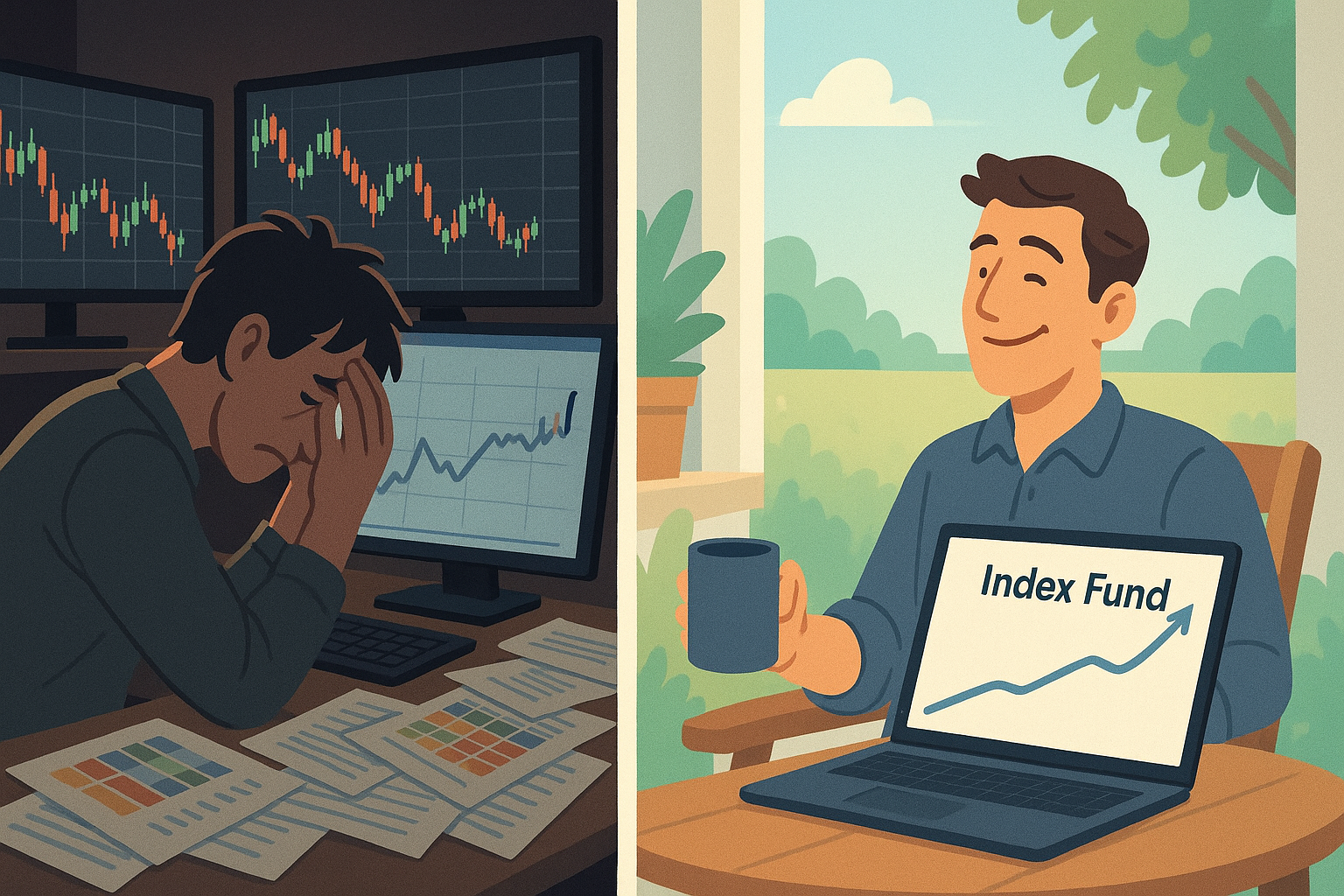The index fund revolution has claimed another victim—me.
I used to be that financial writer with meticulously maintained spreadsheets tracking company metrics. Lord, the hours I spent. Color-coded cells, custom formulas, the works. I approached those documents with the devotion of a medieval monk transcribing sacred texts by candlelight.
But something's changed in the investment landscape. BlackRock just reported another $25 billion flooding into ETFs while active managers watched $8 billion walk out the door. These aren't just industry statistics; they're the visible signs of a personal revolution happening in brokerage accounts across America.
Let's call it what it is: the Great Capitulation.
Remember when picking stocks was actually fun? (I do, barely.) You'd curl up with an earnings report on a Sunday afternoon, spot that improving margin trend nobody seemed to notice, and place your calculated bet. Three months later—boom!—unexpectedly strong results, and suddenly you're feeling like Michael Burry without all the, you know, social awkwardness.
Then the market changed. Or maybe we did.
Today's stock market operates with all the predictability of a toddler who just discovered espresso. The scenario plays out with depressing regularity: you research diligently, make a thoughtful investment based on fundamentals, then wake up to find your stock down 26% because—get this—the CEO used the phrase "cautious optimism" instead of "strong visibility" on the earnings call.
Or worse. Some 23-year-old TikTok influencer declares your carefully chosen value stock "basically Blockbuster" and triggers an algorithmic selling cascade that makes your stomach drop faster than your portfolio value.
The psychological toll? It's real.
I've started thinking about this in terms of what I call "anxiety-adjusted returns." The math isn't complicated: Take your actual returns and subtract the cost of your deteriorating mental health. So your clever stock picks outperformed the S&P by 2% last year? Fantastic! But did you also check your portfolio 17 times daily and wake up at 3 AM in a cold sweat worried about Fed minutes? Well... there goes your outperformance.
Look, the case for passive investing isn't just about raw performance—though we should acknowledge that most active managers underperform their benchmarks after fees. It's about reclaiming your sanity in a market that increasingly resembles a casino run by robots and influenced by whatever's trending on social media.
The evidence is everywhere if you're willing to see it. JPMorgan's research shows that the average stock now experiences four times the volatility around earnings than it did a decade ago. One-day moves of 10%+ have become distressingly common, even for blue-chip companies that merely "met expectations."
Having covered financial markets for years, I've watched the rise of options trading, algorithmic strategies, and a financial media ecosystem dependent on dramatic narratives transform earnings season into quarterly psychological warfare.
"But what about Warren Buffett?" I hear you protest.
Fair point. Some investors do consistently outperform. They also typically have information advantages, dedicated analytical teams, and psychological constitutions that make Navy SEALs look emotionally fragile. Ask yourself honestly: Does that describe you?
Consider too the opportunity cost. Those hours spent researching semiconductor manufacturing processes or trying to decipher whether consumer packaged goods demand is truly "elasticity-resistant" could be spent on... well, almost anything else. Your career. Your relationships. Activities that bring joy rather than cortisol spikes.
I'm not suggesting complete surrender to passive investing. Perhaps the sensible middle path is what some call "core and explore"—keeping 80-90% in low-cost index funds while maintaining a smaller portfolio of individual names for intellectual satisfaction and the occasional adrenaline rush. It's like having a retirement account and a casino budget, separate but under the same roof.
The financial industry has spent decades—and billions in marketing dollars—selling the myth that stock picking is both necessary and rewarding for individual investors. But as markets grow increasingly professionalized, volatile, and influenced by forces no spreadsheet can model, perhaps the truly sophisticated move is simplicity itself.
A veteran hedge fund manager I interviewed last month put it bluntly: "I spend all day trying to beat the market, and most of my personal money is in index funds. What does that tell you?"
It tells me everything I need to know.
